Horses have always been the soul of Sumba. When Carol Sharpe visited the Indonesian island almost a decade ago, she fell in love with its rugged beauty and made it her mission to incorporate the local horses into the tourism offerings at Nihi Sumba resort.
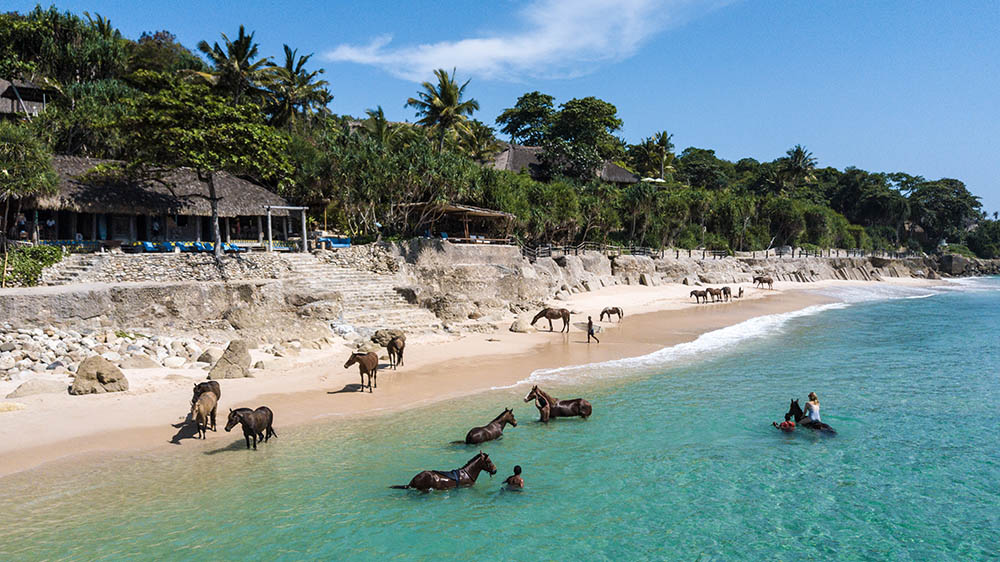
Located in the East Nusa Tenggara province of Indonesia, the island of Sumba has flown under the radar and long been a well-kept secret amongst surfers and adventurers. Towards the western tip of the island on the pristine Nihiwatu beach lies a stunning resort that delivers a world-renowned wave, wellness retreat, fine dining… and beautiful horses.
Founded in 1988 by keen surfers Claude and Petra Graves, Nihi Sumba resort was acquired by American entrepreneur Christopher Burch and South African-born hotelier James McBride a decade ago. Nihi has since evolved into one of the world’s leading resorts and provides an example of a sustainable operation in harmony with the environment and the local people.
Horse lover Carol Sharpe came to Nihi in 2013 along with her husband who was working on a project at the resort; she fell head over heels in love with the forgotten island. “It was on this visit I met James McBride. He suggested – in the knowledge I like horses – to take a walk to the far end of the property and take a look at the ponies he had bought for their guests. I was really keen to find a role for myself, so I approached him with the idea of setting up an equestrian facility for the guests. Having worked in the field of tourism and facilities development, I felt I had enough experience to make a real difference,” says Carol of her initial involvement at Nihi.
SOURCING HORSES & STAFF
“James was keen to build up a herd of horses for guests to ride on the beach. The trouble was the local ponies were too small; we had to source larger horses. Initially it was suggested I source them from Bali, but I had heard of horses on the east of the island that were used for racing and wondered if these might be suitable. Most of the horses I saw I didn’t think I could use for guests – in Sumba they are trained rough and ready and are therefore too wild for strolls down the beach at sunset, but I didn’t want to give up.”
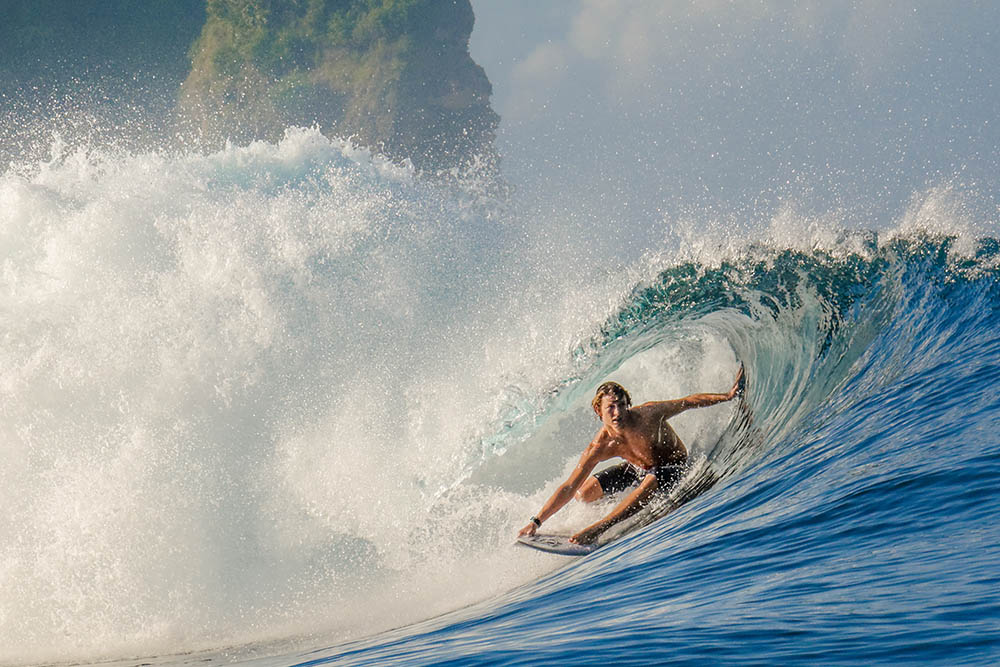
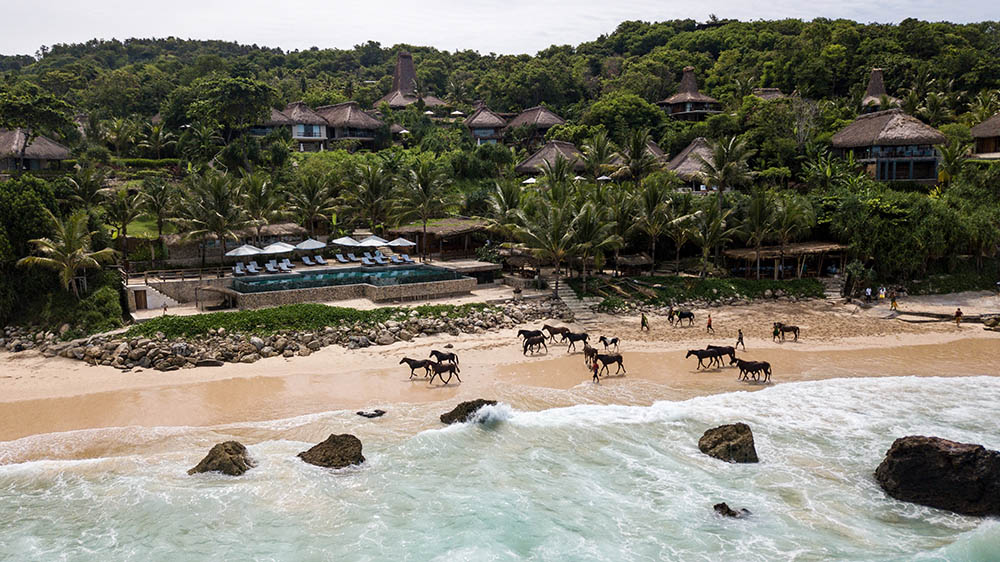
And so Sandalwood Stables was born. Over the past eight years, Carol has adopted horses from the local racetrack and integrated them into Nihi’s equestrian program of beach riding, swimming and equine meditation.
“The staff are all boys from local villages,” explains Carol. “Horses are a very important part of the Sumbanese culture, but when I first employed them they had no idea of Western methods or needs and couldn’t grasp the concept of introducing horses to a calmer life. “Most villagers have a horse or two in the family – either for racing as in village against village, or transporting food. The staff therefore believed the feistier and more out of control the better, so it was a learning experience for me and for them to try and introduce different methods for the resort horses.
“I started with three local village boys in 2014 – who are still with me – and now we have a 10-strong team. Some were employed by Nihi originally on the manual side, such as garden maintenance and such, but they wanted to work with horses and the Nihi ethos is very much to keep everyone employed as one family. Over time I have seen these young men blossom and bloom and they are now everything from basic farriers to vets; they can administer injections to horses, know basic first aid for horse and human and can guide guests across the island on treks. They are learning to read and write and work with computers, and all of this has been a complete delight to witness. Over time I have given them more responsibility and I am really proud of them all.”
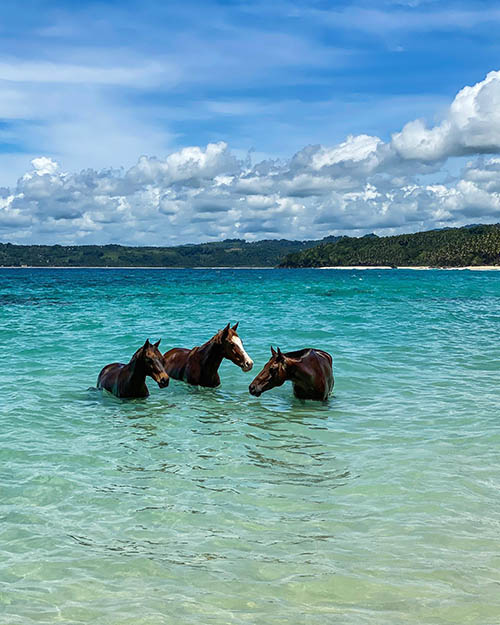
THE FIRST HORSE
The first ex-racehorse Carol acquired for Nihi belonged to the local mayor of one of the island’s towns. “His sale was a bargaining tool for some business decisions with Nihi, so management bought this animal and I didn’t have much choice in him coming! He turned up with a terrible attitude and used to try and get me off all the time rearing. With groundwork he would charge at me and there was no way in the world he would be befriended,” recalls Carol.
“One day I was in the arena with him, trying to lunge him yet again – I had to use two lunge whips to fend him off at the time – and as usual he kept running at me. I was tired and frustrated – and was beginning to feel pressure to get horses ready for guests and was doubting my horsemanship abilities – so I took him off the lunge and left him free rein. As usual he trotted to the gate and stood there waiting to be let out.
“I was disheartened and sat on the ground, and for a brief second wanted to give up on him and on the whole idea. I surrendered and let go and I am not sure how long I was there but the next thing I knew I felt a muzzle on my ear and I could feel his breath right there on me. I stayed for a while and then I got up and moved to the exterior of the arena… and he followed me. We stayed there for a moment motionless and it was a turning point.
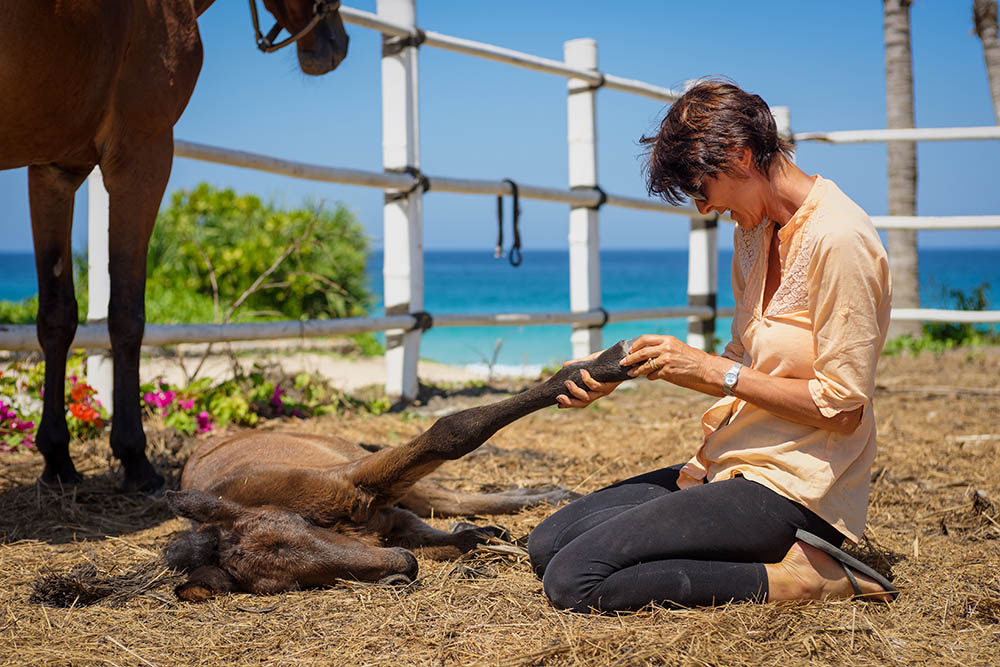
“I realised at that very moment that I needed to lose my agenda. This horse reminded me to stop and listen; he just wanted to be listened to and that’s where the meditation with horses [now an offering at Nihi] comes from.”
Carol says that although she honestly can’t say that she has a favourite horse, if she had to choose she says it would be this first one, whom she named Covo. “After all, he’s named after my husband, whose nickname is Covo!”
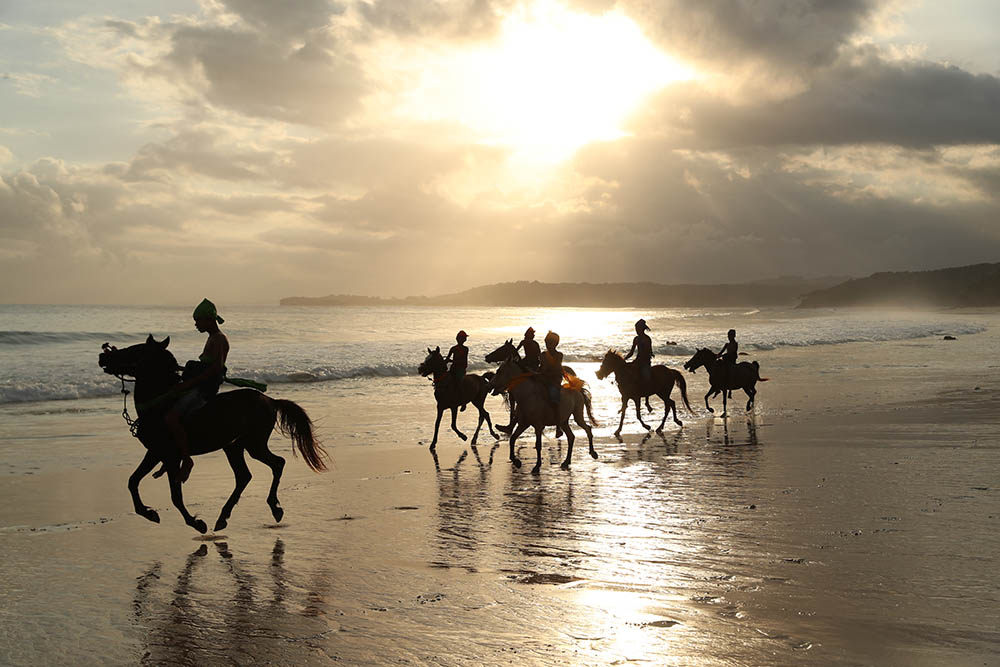

THE SOUL OF SUMBA
“Horses are very important part of Sumbanese life,” explains Carol. “They came to the island via trading many moons ago and villages used them for transporting food, racing and also for religious beliefs. They have deep-rooted traditions and sacrifices make up a very important part of this. At funerals and wedding celebrations they carry out sacrifices and animals – not only horses but also buffalo and wild pig – carry status and are a form of high currency. Bloodshed on the ground is giving back to the gods. The more animals you sacrifice, the higher your status. It is a huge part of their life, and they believe their soul is connected to the horse – so if you are a horseman you need to sacrifice a horse in order to be carried into the next life.
“Pasola is a tradition that happens annually where villagers attack each other on horseback in order to shed blood to the gods; the most noble death is to die in this way,” explains Carol of the centuries-old traditional war ceremony.
Carol says that, as a horse lover from a different cultural background, it is hard to witness some of these traditions, but over time she has learnt to come from a place of non-judgment. “There are many things that have shocked me since I have been here, but when I sit back and view the world from the Subanese point of view it helps me to come from a less judgemental stance. For example, after the sacrifice the villagers are fed – and Sumba is one of the poorest of the Indonesian islands – so in this way it becomes a circle of life.
“It is incredibly important for me to work alongside the villagers in order to educate them and this does not come from a critical point of view. My vision has always been to create a ripple effect of natural horsemanship. I have taught my staff to connect with horses and they have learnt that through love they can get so much more out of them.”
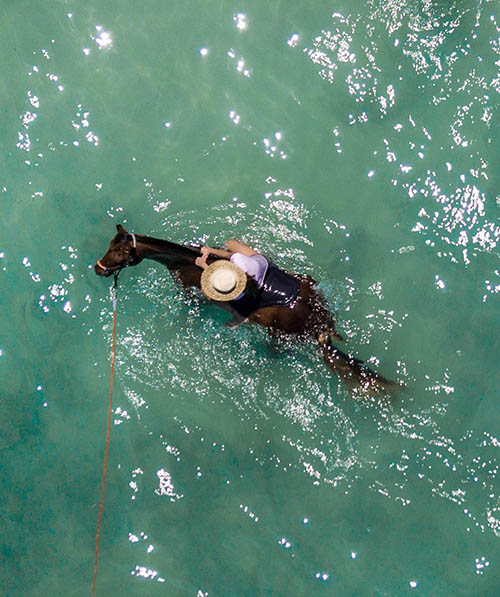
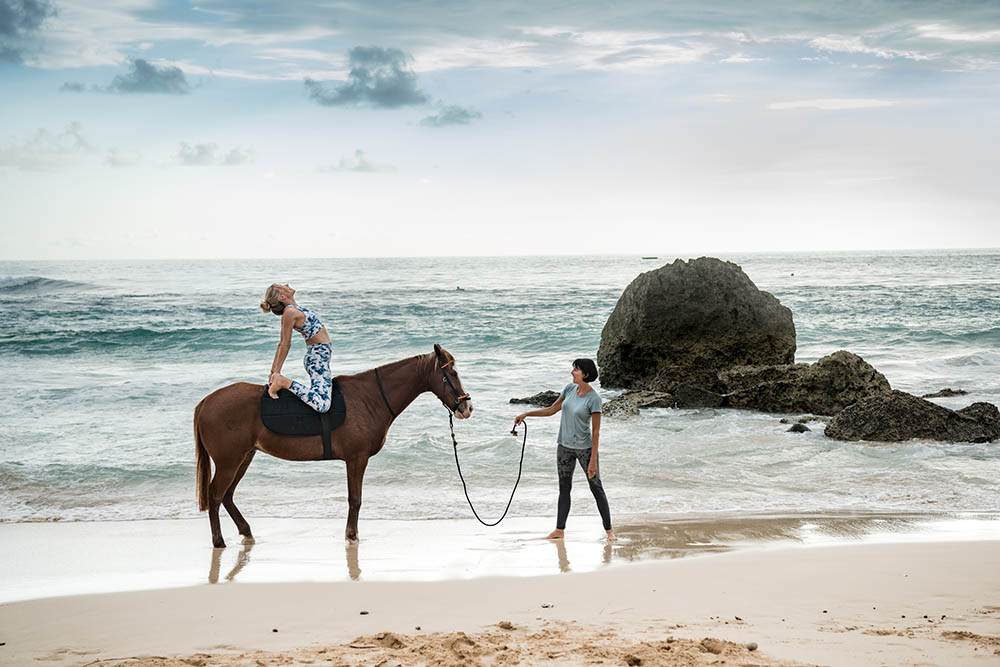
HANDING OVER THE REINS
“Now the local children come down to the resort and bring their ponies to show guests pony racing and this gives me so much joy as it is an ideal place for me to start. Many of the children then choose to spend time at the stables and this way I can subtly teach them how to be gentler in their approach. If I can start with the children, I can hopefully bring education to future generations.”
Carol has great pride for the local team that works with Nihi’s horses, and her plan is that over time they take over the day-to-day running of Sandalwood Stables. “It was with this pride in mind – and seeing how well they have progressed – I thought, wouldn’t it be wonderful if one day these guys were managers of the operation and it would become theirs.
“I planted it as a seed initially and they thought I was being sarcastic, but over time they began to understand and I am now on site only every six to eight weeks. The rest of the time they take care of the operation.
“It’s been progressive over the years, but over the last 12 months I have stepped further and further back. I try to stay in the background and I leave the guests to them, unless it is the equine connection therapy [meditation and yoga] – which I run. I probably spend more time training the staff now than the horses and I like to think their gentle ways are taken home with them.”
RELAX IN THE SADDLE
Over the years, Carol has seen a change in the tourists who are coming to Nihi with an interest in the horses. “Increasingly we are seeing more riders visiting as opposed to beach ride beginners, which is exciting as it allows us to expand our amazing trail rides round the island and bring in different elements such as spa rides, picnics and even camp-outs. The healing with horses and yoga and meditation has also attracted a lot more horse-savvy guests and this is great for me as I can now look to build on this area also, which is my absolute passion.” EQ
If you’re dreaming of a holiday in paradise post-Covid restrictions, Nihi Sumba is the perfect place to relax and unwind – whilst also enjoying the company of horses. For more information, please visit the website, nihi.com
YOU MIGHT ALSO LIKE TO READ:
Helping the Horses of Gili – Equestrian Life, May, 2021
A Godsend for the Connemara – Equestrian Life, February, 2021
Hidden Treasure of Diamond Beach – Equestrian Life, January, 2021
A Glimpse of Nature’s Masterpiece – Equestrian Life, September, 2020

